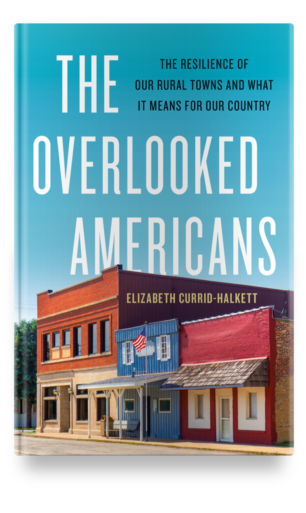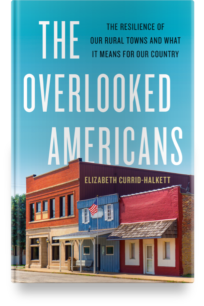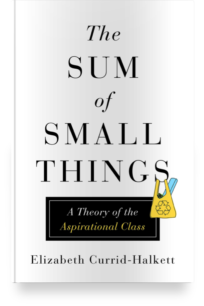
Currid-Halkett’s research focuses on the role of culture in society. Currid-Halkett has studied the importance of the arts to urban economies, the American consumer economy and most recently the role of culture in geographic and class divides.
Currid-Halkett is a member of the World Economic Forum’s Expert Network and a former member of the WEF Global Future Councils and Industry Strategy Officers.
Currid-Halkett received her PhD from Columbia University.
Books by Elizabeth Currid-Halkett
Selected Praise for Currid-Halkett's Books
“The Overlooked Americans is a much needed reassessment of small town life in rural America. Elizabeth Currid-Halkett shows that Americans aren’t nearly divided by geography as the punditry and media would have us believe. This moving book is essential reading for all who care about the future of our country and its people.”
“Elizabeth Currid-Halkett has long been a formidable observer of cultural trends, but with The Overlooked Americans, she deftly combines qualitative and quantitative research to create a riveting, clear-eyed, and often surprising portrait of small-town America.”
“This is an essential book that will change the public debate on the state of the nation.”
“What is America really? Elizabeth Curid-Halkett pierces through the noise and challenges mainstream narratives with this timely, rigorous, and heartfelt analysis. The Overlooked Americans tears down entrenched definitions and stereotypes and builds a new image of rural America that is not hopelessly divided from urban America. Nuanced, cogent, and empathetic, this book deserves attention from politicians, pundits, and the public.”
“The Overlooked Americans is a powerful antidote to the drop-in ‘diner interview.’ Currid-Halkett takes a sledgehammer of data to cherished myths about rural America and replaces them with empathetic portraits of complexity and contradiction. Her bottom line: America is not as divided as many Americans think nor in the ways we’ve been led to believe.”
“[Currid-Halkett] is right … that rural Americans are more racially diverse, more productive, and more broad-minded than the press and Hollywood would have us believe…. Rural America, moreover—she supports this claim by an array of statistics—compares favorably with big-city life in several important categories: home-ownership, employment, income equality, median income.”
“This book was a thrill for me to read….a lot of what [Currid-Halkett] is talking about are things I’ve experienced coming from rural America…incredible research and data analysis.”
“Thoughtful, detailed, and thorough.”
“A lively dismantling of preconceptions about the rural U.S…. A hopeful and provocative analysis bound to raise discussion.”
“Elizabeth Currid-Halkett looks at the way we look at one another from a commonsense, down to earth viewpoint that doesn’t overtalk. Readers should know that there’s a large amount of science in this, and enough data to make a statistician happy, but it’s the interviews that stand tall and stand up for another way of thinking.”
““The Overlooked Americans” educates, and it begs for tolerance, compassion and patience. It’s for grown folks who can see that anger and heel-digging isn’t anything to brag about anymore.”
““I really wish that everybody in Washington, D.C., would read it, on both sides””
“This is the cultural elite — or what Elizabeth Currid-Halkett..calls the “aspirational class”. Her book The Sum of Small Things anatomises it using fascinating American consumption data….Her intellectual ancestor Thorstein Veblen, in his 1899 study The Theory of the Leisure Class, portrayed Wasps frittering away money, but today’s cultural elite is engaged in a ruthless project to reproduce its social position… No wonder the key rite of cultural-elite conversation has become Trump-dissing… And so the cultural wars that got him elected rage on.”
“Her theory is a breath of fresh air…What makes Currid-Halkett’s argument powerful is that she mines the data to prove that the members of this group are passing on their privilege to their children in just as pernicious a way as the old aristocrats passed on their estates and titles.”
“Exploring how the consumer choices of today’s ‘aspirational class’ express identity and values yet reinforce social exclusivity and economic status, Elizabeth Currid-Halkett’s lively book offers a thoroughly researched and fair-minded update to Veblen’s classic look at the leisure class. Eschewing mockery and polemics, The Sum of Small Things challenges readers to think hard about culture and consumption in a postscarcity economy.”
“‘Organic’, ‘artisanal’, ‘boutique’–these are the catchwords of what has become, in Elizabeth Currid-Halkett’s view, a new self-regarding social class, grounded less in money than in elite education, and inured to the problems of those less fortunate. This is a timely, original, and disquieting analysis of contemporary American society.”
“There is a lot to learn here about the contemporary face of income inequality.”
“Elizabeth Currid-Halkett, author of The Sum of Small Things, says a new cultural elite is on the rise: the aspirational class. These are people who aren’t necessarily rich but who share a set of views on the most socially conscious ways to spend money…. That’s why, for this milieu, “a $2 heirloom tomato purchased from a farmers’ market is so symbolically weighty … and a white Range Rover is not.””
“The aspirational class gets a kick in the quinoa courtesy of Elizabeth Currid-Halkett’s The Sum of Small Things“
“A key companion to Robert Putnam’s survey of dwindling US social mobility, Our Kids.”
“Rather than filling their garages with flashy cars, today’s rich devote their budgets to less visible but more valuable ends: education, domestic services and cultural capital. A professor at the University of Southern California shows why it is so difficult to stop the privileged position of the elites becoming more entrenched.”




